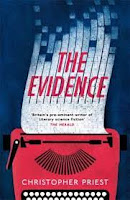As he's gotten older, Christopher Priest has become increasingly a curmudgeon. Aside from the fiction he publishes, Priest's contact with the public is to either promote said fiction, or to whinge about something related to culture or science fiction. It's not becoming, but damn is the man a great writer. To date, the reader rarely found Priest's discontent overtly present in his fiction. With 2016's novel The Evidence, however, the cracks begin to show. But damn is he a good writer...
In its soul, The Evidence is a crime thriller which uses the devices of the genre to actively construct an engaging conspiracy, all the while actively deconstructing the genre with narrative choices intended to call the whole thing into question. While never breaching meta-fictionality, it's nevertheless clear that Priest finds the whole exercise both cathartic (I'll show these mainstream punks that crime fiction is a child's game) yet engaging (I'll show these mainstream punks how to write a truly clever and surprising spot of crime fiction).
The Evidence kick off with curmudgeonly crime writer Todd Fremde being invited to a distant island in the Archipelago to deliver a key note address at a university conference. Arriving on the cold, snowy isle, he finds himself among a stern culture, both heavily regulated but well organized, and interestingly, crime-free. There is a gauntlet of rules he must follow to properly use his hotel room, but the room is warm and the food is nourishing. The conference goes smoothly, save a snafu with a room card from the hotel, and Fremde returns to his home island. Strangely, a colleague he met at the conference calls a short time later, asking about the card from the hotel. What seemed innocuous, however, quickly becomes an opportunity for Fremde to get an inside crime story for his next novel. Things slowly but surely deteriorating, it isn't long before Fremde finds himself in the middle of a crime he doesn't understand.
For those who care about such things, The Evidence is set in Priest's Dream Archipelago setting. But for readers who truly know Priest, they know this makes no difference to the story. The reader need not bring any worldbuilding with them to enjoy the novel. In order to get maximum appreciation from the novel, however, they do need to bring a reasonably good awareness of crime fiction—from a narrative perspective. The history of the genre or experience with it's most famous stories are not needed. Priest playing a perpetual, highly subtle game of bait and switch with the reader's understanding and expectations while digesting the plot, it's possible people with little to no knowledge of crime fiction will walk away perplexed as to what Priest was ultimately attempting.
But even if the reader need not be familiar with famous crime novels, Priest shows himself familiar. More importantly for the novel, however, he shows a deeper understanding of why the genre sustains itself in culture so strongly—the reasons its appeal runs so deep. Never overtly described to the reader, through the story itself and the execution of it Priest shows a deft hand at the form despite never having jumped in over his head in any previous book.
Explaining in full how Priest constructs and subverts crime fiction ultimately requires discussion of the novel's ending, which I will forego here for obvious reasons. I will suffice at saying that the ending will be either appreciated with a delicate nod in Priest's direction for the 5D chess manner in which the plot is resolved, or left expecting more.
In the end, The Evidence is a book which would seem doomed from the start in the fact it's prime goal is to deconstruct a genre. The fact that Priest does this in extremely clever, genre-esque fashion, however, equals the attempt. Fremde's story unwinds in a page-turning manner. It keeps reader in a constant state of engaged wonder through the layers of plot, sub-plot, sub-sub-plot, and meta-fiction. Deep-rooted fans of Priest will likely also appreciate the manner in which Priest blends in many other recognizable elements of his other fiction. Not his magnum opus, the book nevertheless acts as a nexus of sorts regarding devices and interests appearing in his other works.


No comments:
Post a Comment